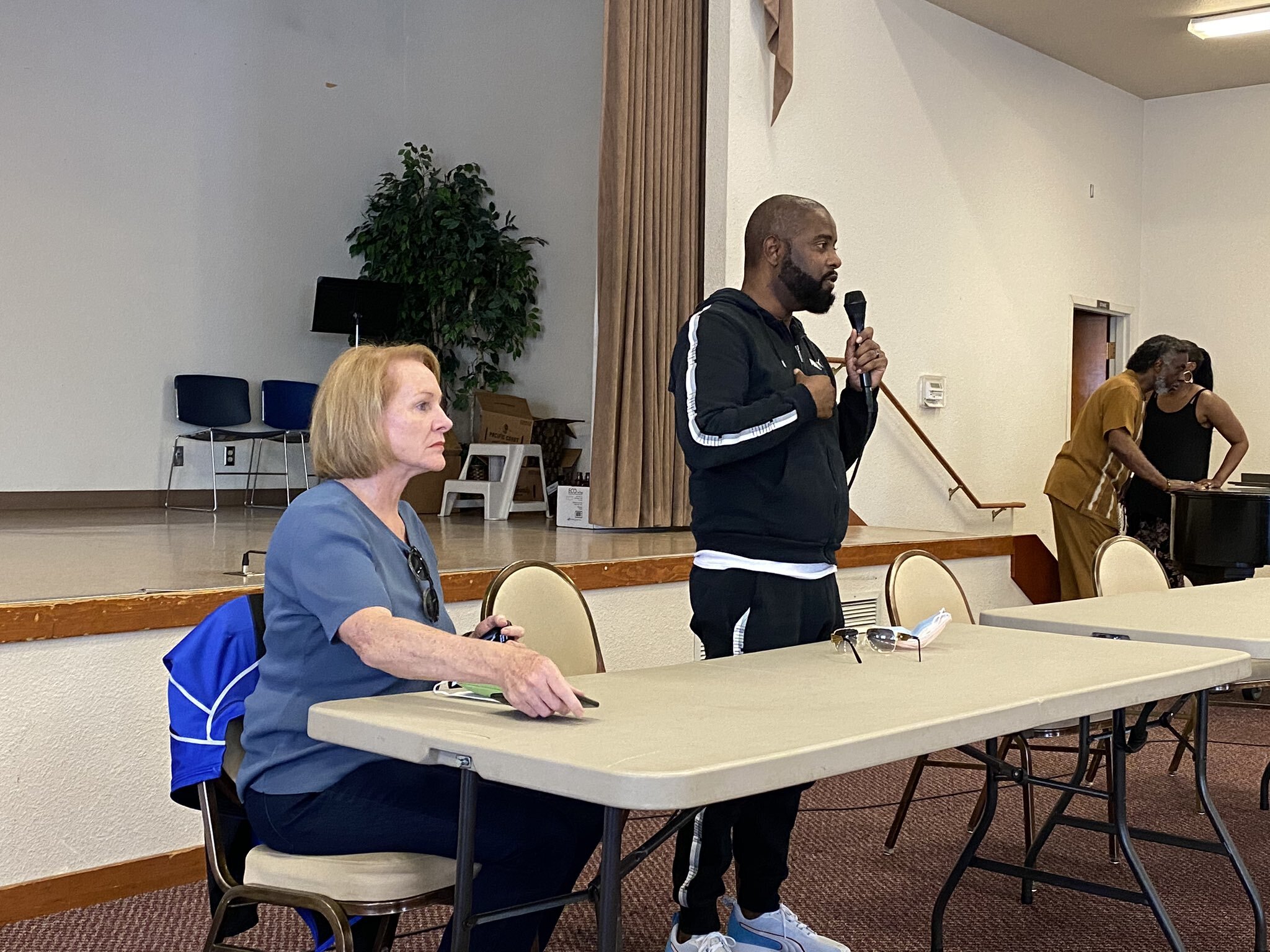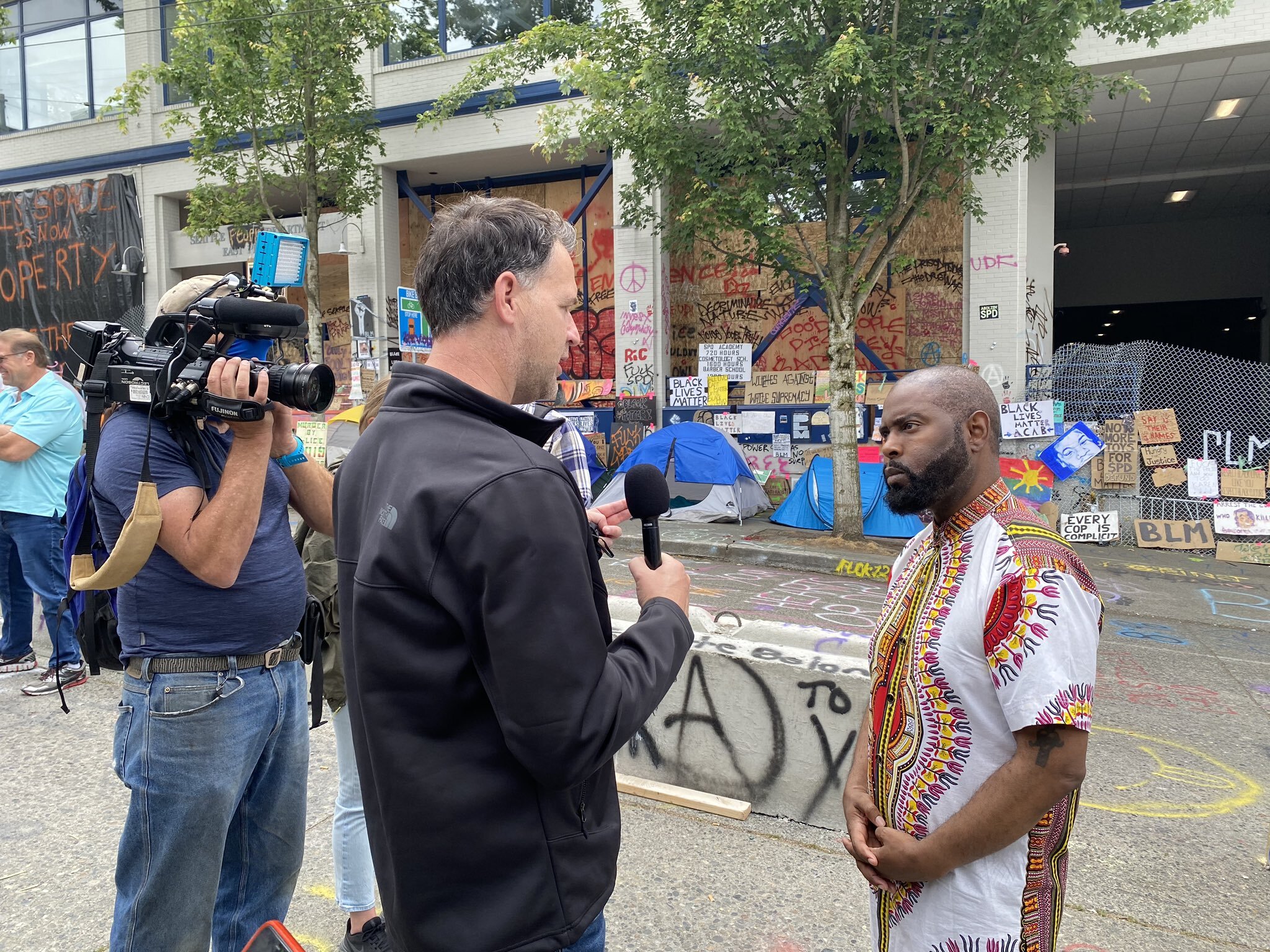Opinion: Street Czar or Smoke Screen? It’s hard to say with André Taylor
By Julie-C
André Taylor introduces Mayor Durkan at a June 26, 2020 meeting with members of the CHOP protest zone. Photo by Omari Salisbury.
When PubliCola published details of Andrè Taylor’s $150,000 contract as the new “Street Czar of Seattle” earlier this month, the story set off a wave of sensational headlines local to global about the “ex-pimp Seattle hired” to provide “community de-escalation services” and “recommendations on alternatives to policing,” among other things.
Much of the uproar was predictably hinged on respectability politics and right wing outrage — something Taylor is unafraid to confront head on in interviews and social media. As a reformed pimp and ex-con who turned to activism in 2016 after his own brother Che Taylor was murdered by Seattle police, André Taylor’s well-sung backstory is a known part of his political rise to being a convening force behind De-Escalate Washington, the coalition that passed the historic I-940. It is also what lends André’s name the kind of street credibility that almost gets him a pass for negotiating a contract in the midst of a struggle to defund police with one of the movement’s biggest opponents — Mayor Jenny Durkan. Almost.
The reality is, the questions and critiques being raised in the community regarding Taylor’s new position are much less easily dismissed than those driving the corporate media coverage. On September 23, Converge Media’s Omari Salisbury, who first covered Taylor and his organization Not This Time in 2016, sat down with the Street Czar in his new municipal tower office to open up the conversation.
In the video, Taylor breaks down his inspiration for the “Street Czar” title (the Obama administration), his Street Czar role models (Nipsey Hustle’s OG and others like Omari himself), and his jurisdiction as Street Czar (the entire city, not just Capitol Hill). “What’s important about a ‘Street Czar,’ why I coined the phrase,” he explains, “is that it's an individual that has gone through some things in his life, has overcome some things in his life, and yet has credibility because of the things that he's gone through and overcame.” He isn’t wrong.
However, when asked how this differs from and impacts investments that the city is already making to community-rooted organizations that embody this approach — such as Community Passageways — Taylor’s answer seems to reveal a disconnect. While he validly points to the coalition-building and leadership that Not This Time provided in passing I-940, he also acknowledges that the effort was accomplished with vast community support which included Tribal organizations, Seattle’s People Party, trench-level collectives such as Seattle Black Book Club, and dozens more. The fact he dances around, despite reference to these community contributions, is that among the many grassroots entities involved in passing I-940, some of which are leading voices in Seattle’s current defund movement, he is the lone wolf (or lamb) now standing alongside one of our biggest barriers.
André Taylor speaking with CNN about developments in the CHOP Zone on June 24, 2020. Photo by Omari Salisbury.
What is Taylor's relationship to the mayor? In his answer to this question, Taylor offers his leanings on the ‘revolution vs. reform’ spectrum — in a way that starkly betrays his frequent invocations of Malcolm X: “I have worked with law enforcement, and I’m still willing to work with law enforcement... I think that law enforcement has a place to play in reform. I’m not the type of individual that is an abolitionist — that thinks that all prisons need to be done away with or, you know, that mindset.” He also emphasizes he has no influence over the mayor and her policies, and that he is just seizing an opportunity to continue building on their working friendship.
Although Taylor’s reformist tendencies aren’t new, it’s also a position that has already alienated him from a large pocket of the freshly radicalized — the young people who have been in the streets daily since George Floyd’s murder. And, aren’t these the very youth he was being called into (dis)engage when he was conjured by Durkan’s office to dismantle CHOP months earlier — back when the terms of his Street Czar contract with the city was first struck? To this, Taylor re-emphasizes the scale of his jurisdiction and his commitment to Black and Brown families all over the city. He shares his current plans to propose to Durkan a mental and behavioral health model to provide more culturally competent, continuous services to those getting out of prison. When asked about the criticism over his substantial contract, he emphasizes the importance of Black and Brown people “getting compensated for your genius and your brilliance and your abilities and your skills.” He isn’t wrong.
Still it remains that André Taylor may have some longterm trust-building to do with members of communities for which he claims to advocate. From one end, the ongoing gun violence impacting Black youth in the streets of Seattle is at a tangible upswing, and the un-officiated “street czars” on the frontlines of response, intervention, and prevention are already systematically overstretched and underfunded. Collectively challenging this structural disparity is what efforts like King County Equity Now’s (KCEN) Black Brilliance Research Project, #FreeTheFunds, and the push for Participatory Budgeting in 2021 are all about — efforts that the mayor is actively trying to undermine with a $100m bootleg Rolex (poached from other community investments). Will Taylor stand with KCEN in the historic effort to democratize the budget process, or be a tool of validation for the mayor’s political agenda from the confines of her taskforce?
From another end, the ongoing movement in the streets of Seattle is young, radical, and neither hierarchical nor patriarchal in its ideals. It embraces a diversity of tactics and is unabashed in its abolitionist vision to dismantle the current system as it stands. It is also collectively aware of the political maneuvering coming from the mayor’s office to undermine these objectives. Maneuvering by which Taylor is literally standing with, if only symbolically, at press conferences.
So while André Taylor’s roots in the streets, bootstrap background, and past political successes have more than earned him the right to eat well at the mayor’s table with the very best of her dinner guests, it is equally valid for the streets to keep close watch on that tab — and who might get stuck with it. Because if there’s anything known for certain about the complexities of now, it’s that the stakes are high and rising, and the “reform” way of doing things might not fly this time around.
———
Julie-C is a community organizer, cultural advocate, educator, and Hip Hop artist hailing from the Coast Salish Autonomous Zone/Technocratic City-State of Seattle. Her music can be found at SovereignQueendomArchives.Com.



